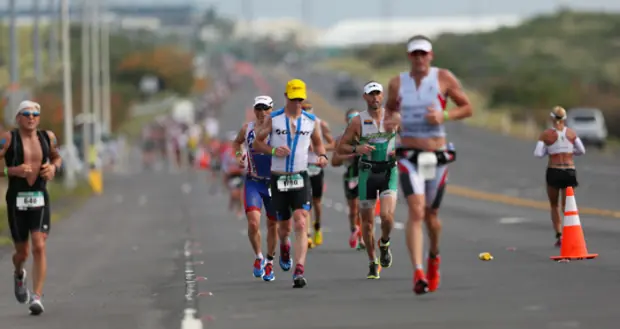
Heading into the new season is a good time to review some of the goal-achieving techniques by Wayne Kurtz, author, speaker and master of the ultra-triathlon scene. Wayne put on a demonstration of his psychological skills when he and a handful of others finished the largely-impossible-to-imagine Triple Deca Iron race--30 IRONMAN-length triathlons in 30 days.
"It was a death march," is how Kurtz described the Triple Deca. "The weather turned cold and rainy. There were 40-mile-per-hour winds." Yet Kurtz was able to hang on for a finish in a time of 453 hours and 7 minutes, earning him 6th place. His best IRONMAN of the 30? 13 hours and 18 minutes. (There was an incentive to finish as fast as possible not only for overall time concerns, but the sooner you wrapped up the day's race, the more time you had to recover, eat, sleep and fix your bike. On bad days, when an IRONMAN took 17 hours or more, a competitor faced the unworldly prospect of getting only an hour or two of sleep (or none at all) before it was time to report again to the merciless starting line).
In addition to his consulting business, Kurtz is also a coach, and we asked what advice he might have for fellow athletes of all stripes on the subjects of setting goals and, something he's clearly good at, sticking to them.
"In my 27 years of racing experience I think the biggest asset of what separates winners and those who never meet their goals is mental toughness," Kurtz says.
Establish clear race goals.
For your key races, mark down the dates of each race in your 2014 training log. This is your starting point.
Make every workout count.
Kurtz advises that you have a clear and precise goal for each workout. "I have a written goal for each, prior to getting started."
Conduct Workout and Race Postmortems.
Kurtz says to follow each workout and race with time spent jotting down notes in the training log. "Every workout you should evaluate what went right, what went wrong, what challenges you need to work on."
Know thyself and act accordingly.
Within your training and racing journal, keep a running spotlight on your three biggest strengths and three biggest weaknesses. "I focus on these every day," says Kurtz, adding that a long range goal should always be in chipping away toward transforming those weaknesses into weapons.
Be prepared.
In getting set for a big race, be careful to not simply churn through workouts under ideal conditions. Kurtz employs rehearsal exercises to be prepared for whatever challenges he may face. In his training, he'll simulate "stomach distress runs," "severe fatigued-leg runs" and "horrific weather workouts." So consider the worst-case scenarios that you may plague you on race day and construct suitable conditioning sessions. Says Kurtz, "It may sound barbaric, but learning how to handle these significant challenges in training makes it easier to overcome them in races."
Stay in the present.
In extreme endurance events--be it a marathon, an IRONMAN or the Triple DECA-- the imagination can easily become overwhelmed by the magnitude what's involved. This applies even to relatively short events, like the 1500-meter run on the track, where the impending intensity and discomfort is so high that the worse part of the race can be the minutes before the starting gun. "Learn to focus on your breathing," Kurtz says. Try and reign in any negative thoughts by clearing your mind and taking deep, full breaths. At the Triple DECA, Kurtz constantly worked at connecting his thoughts to the immediate work at hand as opposed to letting them drift toward the future hours, days and weeks of the event.
The Rope Strategy.
During an endurance event like an IRONMAN or a marathon, Kurtz says, use the Rope Strategy to get through lulls in energy and performance. "Visualize a rope tied to the person in front of you in the race and just get the mindset of 'hanging on,' repeating those words again and again to let them actually pull you along and not ever losing sight of them."
Quitting is not an option.
"More than anything else," Kurtz says, "I build into the minds of my clients that there is never an option of not finishing a race. Setting this expectation early on and in writing is imperative to a comprehensive mental strength plan."
Recent Articles:
- 6 Ways Triathletes Can Get Faster On The Bike
- Lose the Belly Fat: Weight Management for Triathletes
- 5 Keys To Improving Your Swim Technique
Connect with us on Twitter, Facebook, Instagram or Pinterest for more tips, recipes and ideas to fuel your ACTIVE life.
 Put your mental strength to the test. Sign up for a triathlon.
Put your mental strength to the test. Sign up for a triathlon.


